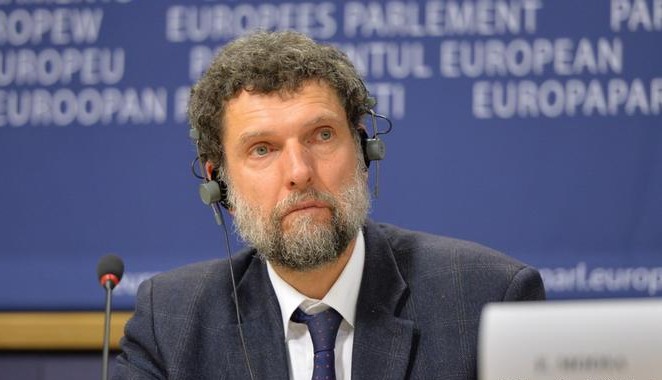An international platform established by four judges associations in Europe to promote the rule of law in Turkey has called on the country to take the necessary steps for the restoration of the rule of law and to comply with rulings of the European Court of Human Rights (ECtHR).
The Platform for an Independent Judiciary in Turkey released a statement on Monday reaffirming its “deep concern” about the erosion of the rule of law in Turkey, citing several prominent cases as examples, which the platform described as “a systemic pattern of disregard of fundamental principles of fair trial by Turkish courts at every level.”
The platform cited the cases of prominent businessman and rights advocate Osman Kavala and opposition lawmaker Can Atalay in addition to the case of a teacher whose conviction on terrorism charges following a coup attempt in Turkey in 2016 was the subject of a landmark decision from the ECtHR last September for thousands of people who faced similar charges due to their links to a faith-based group.
Kavala, who has been behind bars since October 2017 facing charges that have ranged from espionage and financing anti-government protests in 2013, has not been released from prison despite rulings from the ECtHR in his favor. Atalay, who was elected to the Turkish Parliament in May while serving a prison sentence on politically motivated charges, remains incarcerated despite two rulings from the Constitutional Court that found rights violations in his continued imprisonment despite gaining parliamentary immunity.
“All this undermines the principles of justice, human rights, and democracy as well as the basis of the European Convention on Human Rights system as a whole, and requires immediate attention,” the statement said, adding that these cases “represent the [tip] of an iceberg of thousands of cases of judicial misconduct and political interference.”
The other case mentioned in the statement concerns former teacher Yüksel Yalçınkaya, who was convicted on terrorism charges due to his links to the Gülen movement following the coup attempt.
The Gülen movement, inspired by Turkish cleric Fethullah Gülen, is accused by the Turkish government and President Recep Tayyip Erdoğan of masterminding the failed coup and is labeled a “terrorist organization,” although the movement denies involvement in the coup attempt or any terrorist activity.
The ECtHR’s Grand Chamber found Turkey had violated three articles of the European Convention on Human Rights in his case: Article 6, which concerns the right to a fair trial; Article 7 on no punishment without law; and Article 11 on freedom of assembly and association.
Legal experts said the grand chamber’s decision made clear that actions considered by the Turkish authorities to be criminal such as the use of ByLock, a mobile phone application believed to be a secret communication tool among Gülen followers, depositing money at a Gülen-linked bank or being a member of a Glen-affiliated association cannot be considered criminal evidence against Gülen movement members.
The platform said the Yalçınkaya case serves as another stark example of the systemic nature of human rights abuses within the Turkish judicial system, adding that the ECtHR’s landmark decision nullifying investigations and convictions in line with the principle of “no crime without law” reveals “the gravity of the issues affecting not only Yalçınkaya but also thousands of others, in the context of a systemic failure in guaranteeing fair trial, legal certainty, and freedom of expression.”
The statement said the Platform for an Independent Judiciary in Turkey aligns itself with Council of Europe Parliamentary Assembly Resolution 2518 adopted in October, urging Council of Europe member and observer states, as well as the European Union to: urge the immediate release not only of human rights defender Osman Kavala and Can Atalay, but of all those who are currently detained or convicted unjustly; take urgent action to support improvements to the protection of the rule of law and human rights in Turkey; and ensure the application of targeted sanctions against officials responsible for the arbitrary deprivation of liberty of Osman Kavala and others, either by member states or through collective action.
“The legal system of Türkiye is currently in agony, with a judiciary operating without independence. To steer the nation away from this crisis and mend the damage inflicted upon judicial independence, it is crucial to ensure the implementation of decisions of the European Court of Human Rights,” the platform added.
The statement was undersigned by President of the Association of European Administrative Judges (AEAJ) Sylvain Mérenne, President of the European Association of Judges (EAJ) Mikael Sjöberg, President of Judges for Judges Tamara Trotman and President of Magistrats Européens pour la Démocratie et les Libertés (MEDEL) Mariarosaria Guglielmi. The four associations established the Platform for an Independent Judiciary in Turkey in 2017 in order to promote the independence of the judiciary in the country and the right to freedom and a fair trial for all the judges and prosecutors who were prosecuted in the aftermath of the failed coup.

